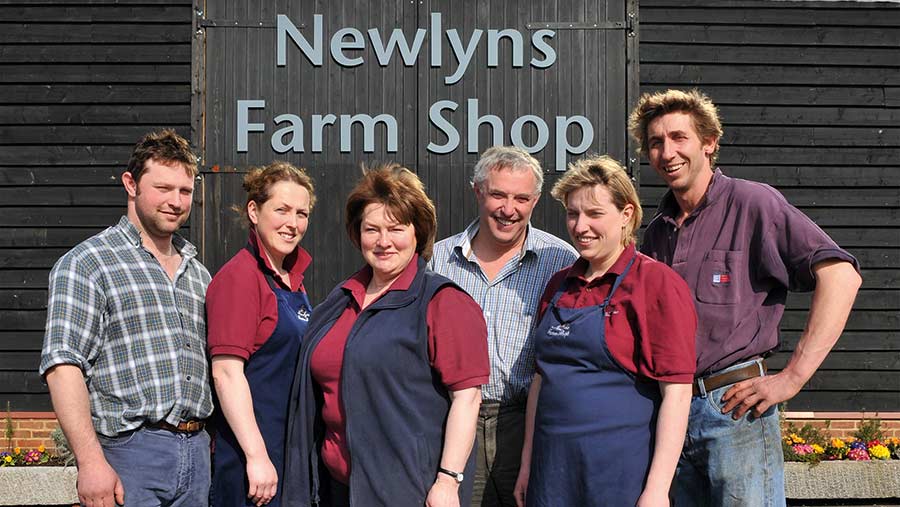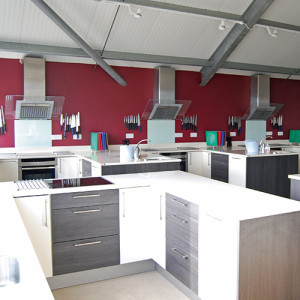Family’s diversification into an on-farm cookery school

Field to fork is a term that many farm retailers use. And the agricultural industry frequently talks about the need to educate the public about where their food comes from.
The Janaway family, who run the award-winning Newlyns Farm Shop in Hampshire, took the “field to fork” message one step further when they opened a cookery school above their shop eight years ago.
“The ethos of linking the farm to the food we sell has always been important to us,” says Abby Janaway (pictured second from left), who is one of the six-strong family team that runs Newlyns.
Parents David and Judy, adult children Rob and Emma and respective partners Abby and Ian are all involved, either working on the 500-acre farm or in the shop, café and cookery school in North Warnborough, near Hook.
See also: More on diversification
The family had been sharing the provenance message with customers in the shop already, but realised that many still weren’t aware of seasonality, traceability or how to cook with different cuts of meat.
“We felt the cookery school was selling our story one step further. We can produce a great bit of beef, but if you don’t know how to cook it, you’re not eating it at its optimum,” says Abby. This education is really important to the family, which is why they run lots of cookery courses for “young chefs” too.
Getting started and set up
The idea for the cookery school came about in 2008, when they were planning to extend the production kitchen for the shop and their café, and they realised that if they went for a second storey on the extension, they could put a teaching kitchen on top.
They worked with a local kitchen company in Basingstoke to install the school and got sponsorship from Neff, a manufacturer of kitchen appliances. In return, Neff uses the kitchen on occasion for demonstrations.
 Abby says that they wanted their kitchen to have a very hands-on teaching approach.
Abby says that they wanted their kitchen to have a very hands-on teaching approach.
There are lots of cookery schools across the country – some of which take more of a demonstration approach, often located in beautiful country houses, and some affiliated with professional chefs or restaurants – but Newlyns wanted lots of space to allow people to cook everything for themselves with the same sort of equipment they would have in their own house.
“We have domestic appliances so that what people do on the course, they can recreate at home,” says Abby. “That’s the sort of decision you have to make when you open a cookery school.”
Abby is a passionate foodie herself and was the cook of all the shop’s ready meals and puddings when they first started out. “I’m just a home cook, I enjoy cooking and I love food. I have no formal training, but I think cooking is all about having the confidence to do it,” she says. “Now, though, I have a team of very qualified chefs behind me.”
Local sourcing, teaching seasonality and butchery
“A lot of what we do is connected to butchery. Our most popular course is ‘Butcher it, cook it, eat it’ – our head butcher will show the class how to bone out joints and stuff them, or what to do with different cuts of meat,” says Abby.
The two chefs who run the kitchen, which accommodates up to 20 people, depending on the course, are passionate about utilising the whole carcass – using old-fashioned cuts and demonstrating how little waste there needs to be.
All the beef, lamb and pork is from the Janaways’ farm, the poultry is from a friend’s farm, the game is from a Hampshire game company and fruit and veg is sourced as locally as possible.
“The educational side is hard when it comes to seasonality because everyone expects everything to be available all year round, but if it’s an English product, such as strawberries, we will sell or use it only when it is in season.”
On the family farm, which is run as a separate business, the Janaways keep traditional and native breeds, with 280 sucklers put to Shorthorn and Hereford bulls and 180 sows put to Berkshire boars. They also have 850 ewes.
Varied courses
With four to five courses on offer each week, the school is always busy. The courses include: “Canapés and starters”, “University survival”, “Taste of Italy” and “Perfect Pastry”.
Daniel Dobbs, head teacher at Newlyns, who trained at Leiths School of Food and Wine in London, says that the bread and baking course is one of his favourites to run.
Newlyns Cookery School provides courses for the public and private tuition as well as corporate days.
For the corporate team-building courses, the clients will go on a tractor-and-trailer ride round the farm and meet and speak to one of the farmers about the produce before returning to the kitchen to cook and eat it.
The cookery school has a dining room where attendees can sit at the end of the day and enjoy the food they have prepared.
Typically, the weekend courses book up first, with daytime weekday courses being the least popular.
There are peaks and troughs through the year too, with lots of people using Christmas gift vouchers in the first few months of the year (or at the end of the year, before they run out) and fewer adults booking on to courses between May and August because lots of people are away. The summer is busy with children’s classes, though.
The young chef classes are not about giving the kids a cake and some icing; there is a big focus on “skills-based” teaching, showing them what goes into a tomato sauce for pasta or pizza, or how to make a white sauce from scratch.
Making the investment work
The teaching kitchen was a big investment, with staff being the most expensive cost, but it has paid off. “The partnerships made it more workable,” Abby says, “but like any investment, you’ve got to believe in it.”
The cookery school grew quickly and it’s a profitable part of the overall business, contributing 7% of revenue.
It has grown year on year – plateauing slightly recently “but it’s an eight-year-old business,” says Abby. “At the moment, we’re looking at how we push forward for the next 10 years.”
One idea they have already put into action is the service of private house chefs. “We send a team of three chefs to cater for a dinner party at someone’s house. The way I see it is that if there is a dinner party of 18 people, 16 of them may never have heard of us, so it’s good for getting our name out there,” Abby explains.
Staffing is probably one of the hardest parts of the management as chefs are very creative people, so they have to find the right chefs who share a passion for the “field to fork” message and want to teach too.
It works well having two chefs at Newlyns because if they’re not running a class, they can test recipes and bounce ideas off each other, choosing seasonal goods from the farm shop.
To anyone else considering setting up an on-farm cookery school, Abby would advise having something that allows your school to be different, and to develop a unique selling point.
“Work out the constraints of your location and your existing business,” she says, “and make sure you are slightly different from the next school.”
